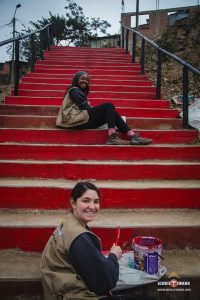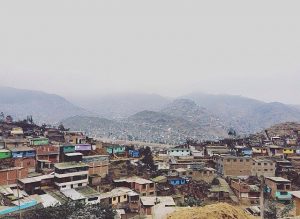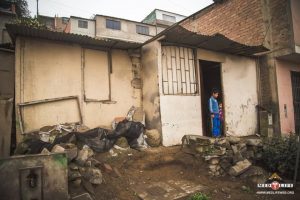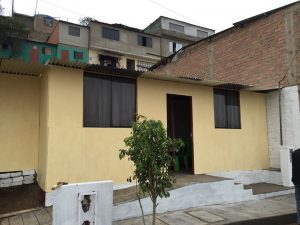This summer I lived in Lima, Peru and interned with the Volunteer Affairs department of MEDLIFE, a non-profit organization that works with low income families in developing countries. Its main goals are to bring medical services to those in poverty and to build relationships with their communities.

In the United States, one often doesn’t see the gap between rich and poor. In Peru, wealth disparities are clearly evident. Thirty percent of the Peruvian population live in Lima, which creates a very concentrated mass of people. To be considered below the poverty line in Peru one has to make less than 348 Sol a month (approximately $116 US dollars), and the poverty rate is about 22% (which is a sharp decline from about 55% in 2005). The poor usually lack basic services such as clean water, electricity and sanitary facilitates.
Although the government provides some health care, called Seguro Integral de Salud (SIS), it is difficult to access. I have seen first hand what a patient’s hospital experience can look like: the wait is usually about 4-8 hours, with no waiting rooms and no guarantee you will see a doctor. To even get an appointment, one has to go to the hospital in person (early if one expects to be seen) for an appointment that will likely be 4-6 weeks later.
As a Volunteer Affairs Intern, I had many different responsibilities. Throughout the week I would be either in the office, in the field, or on a patient follow up. Some of my daily tasks in the office included developing curriculum, coordinating volunteer trips, answering incoming communications and meetings with other departments. One major project I worked on was developing a fundraiser for a school in Kirua, Tanzania. This school is nothing more than a simple room with no bathroom, no kitchen, and insufficient desks for all the students. Many deaths due to diarrhea or parasites are caused by the lack of sanitation facilities. MEDLIFE is working to raise $11,500 to build a bathroom, a kitchen and to donate 29 desks.

On days in the field, I supervised a clinic or worked on a project. If I were supervising a clinic I helped set up the mobile clinics, helped guide volunteers and translated. The projects we worked on were negotiated between MEDLIFE and the community. The community told us what they need most and we helped them build it. The community participation facilitates community pride, which makes our work more sustainable. After our patients checked in to our mobile clinics, if our doctors and nurses determined they needed more continuous care, they were enrolled in our patient follow up program. A MEDLIFE staff member or intern would accompany a MEDLIFE nurse to the patients’ homes to do checkups, deliver medicine, or complete socioeconomic assessments. MEDLIFE covers anywhere from 50-90% of the patients’ costs for however long is necessary.
I also worked on a developmental project for Jorge, one our patients. Jorge suffers from brain atrophy, which means as time goes on, his motor and cognitive abilities diminish. Because of this, he has lost is ability to walk. We provided him with a wheelchair, but even so he was not able to leave his home. We asked his family what we could do, and his wife asked us to build a ramp so he could go outside and play with his children. His son asked us to please help make his dad happy again. As a team we raised $700 in 7 hours! Below is a photo of the before and after when we finished our project.
Over the course of the past three months, I have learned so much about health, public health, myself and the world around me. One of the most important lessons I have learned is the importance of having an interdisciplinary perspective. Approaching the inequalities in health requires some knowledge of human development, human rights, economics, history, sociology and much more. I found that I was most successful in my work when I applied knowledge from an array of different courses. In addition, I solidified my passion for the study of global health. This Peruvian experience has most definitely been a step towards a future in which I work for more equal access to healthcare and for health as a human right.
by Alexa Friedman
Individualized major: Human Health Sciences and Development

